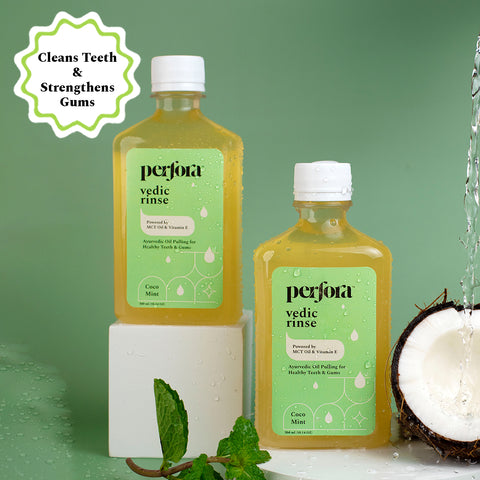Introduction
In our pursuit of impeccable dental health and fresh breath, we often overlook a silent adversary: cavities. At Perfora, we champion the cause of SLS-free dental care, emphasising the importance of natural and gentle approaches to oral hygiene. In this comprehensive guide, we delve into the connection between cavities and bad breath, uncovering the truth behind this often-misunderstood link. Our focus on oil pulling, among other natural remedies, offers a holistic path to combating the dual challenge of tooth decay and bad breath.
Key Takeaways
- Cavities can indeed cause bad breath, as the decay process generates volatile sulphur compounds leading to a distinctive odour.
- Distinguishing bad breath caused by tooth decay is essential, as it requires different treatment from other types of bad breath.
- Maintaining oral hygiene, addressing cavities promptly, and incorporating natural remedies like oil pulling are crucial in managing bad breath caused by tooth decay.
Cavities Explained
What are cavities? Also known as dental caries, cavities are permanently damaged areas in the hard surface of your teeth that develop into tiny openings or holes. Cavities are caused by a combination of factors, including bacteria in your mouth, frequent snacking, sipping sugary drinks, and not cleaning your teeth well. When plaque, a sticky film of bacteria, forms on your teeth, it produces acids that erode the tooth enamel. This process can lead to cavities, which, if untreated, can progress deeper into the tooth and affect the delicate nerve tissue.
The Direct Link: Do Cavities Cause Bad Breath?
The question "Can a cavity cause bad breath?" is frequently asked, and the answer is a resounding yes. Cavities and bad breath are closely connected, as the decay process associated with cavities generates a distinctive and unpleasant odour. This bad breath due to cavity formation is not only uncomfortable but also a sign of deeper dental issues. The bacteria thriving in cavities produce volatile sulphur compounds, which are the primary culprits behind the foul smell.
Identifying Bad Breath Due to Cavity
Distinguishing bad breath caused by tooth decay from other types can be challenging, yet it's crucial for effective treatment. Tooth decay bad breath often has a distinct, persistent odour, different from the bad breath that might result from eating foods like garlic or onions. If you notice a continuous unpleasant smell despite maintaining good oral hygiene, it could indicate that cavities cause bad breath. This type of bad breath, often described as a decaying smell, signifies the need for a dental evaluation.
Cavities and Bad Breath: A Two-Way Street
Understanding the relationship between cavities and bad breath is vital. Not only do cavities stink, but the existence of bad breath can also indicate the presence of tooth decay. It's a two-way street: cavities cause bad breath, and persistent bad breath might signal unchecked cavities or tooth decay. This cycle highlights the importance of addressing both issues concurrently to ensure optimal oral health.

Managing Bad Breath Caused by Tooth Decay
Addressing bad breath caused by tooth decay involves a multifaceted approach. Firstly, it's crucial to treat the underlying cavities to eliminate the source of the bad breath. Dental fillings, crowns, or in severe cases, root canals may be necessary to address the decay. Additionally, adopting a rigorous oral hygiene routine is paramount. This includes regular brushing, flossing, and the use of mouthwashes designed to kill bacteria and freshen breath. Oil pulling, an ancient practice that involves swishing oil in the mouth, can also be a beneficial adjunct therapy. This technique helps in reducing the bacteria that cause bad breath and tooth decay.
Prevention: Keeping Cavities and Bad Breath at Bay
Preventing cavities and, by extension, bad breath caused by tooth decay is essential for maintaining oral and overall health. Here are several effective strategies:
- Maintain Oral Hygiene: Brush your teeth at least twice a day with an SLS-free toothpaste and floss daily to remove plaque and food particles from between your teeth and under the gum line.
- Regular Dental Check-ups: Visiting your dentist regularly for cleanings and check-ups can help prevent cavities and catch any issues early before they lead to bad breath.
- Dietary Choices: Limit sugary and acidic foods and drinks, which contribute to tooth decay. Instead, opt for a diet rich in fruits, vegetables, and whole grains to support dental health.
- Stay Hydrated: Drinking plenty of water throughout the day helps wash away food particles and bacteria in your mouth, reducing the risk of cavities and bad breath.
- Chew Sugar-free Gum: Chewing sugar-free gum can help freshen breath and produce saliva, which neutralises acid and helps protect against tooth decay.
The Role of Oil Pulling
Oil pulling, a traditional remedy rooted in Ayurvedic medicine, has gained popularity as a natural method for improving oral health. This practice involves swishing a tablespoon of oil, typically coconut, sesame, or sunflower oil, in your mouth for 15 to 20 minutes. Among the products catering to this ancient technique is Perfora's Vedic Rinse Coco Mint Oil Pulling, which combines the traditional benefits with a refreshing mint flavor. The process is believed to "pull" bacteria from the mouth, reducing the risk of cavities and neutralizing bad breath. Studies suggest that oil pulling can decrease the bacteria responsible for tooth decay, potentially lowering the incidence of cavities and combating bad breath caused by such decay. By incorporating this method into daily oral hygiene routines, individuals may enhance their oral health in a natural and effective way.

Conclusion
The link between cavities and bad breath is undeniable, with each condition potentially exacerbating the other. Understanding that cavities cause bad breath is the first step toward addressing this common yet often overlooked problem. By embracing preventative measures, including maintaining rigorous oral hygiene, making smart dietary choices, and considering natural remedies like oil pulling, you can protect against cavities and ensure your breath remains fresh.
At Perfora, we advocate for a holistic approach to dental care, emphasising the importance of SLS-free products and natural practices like oil pulling. By addressing the root causes of dental issues, such as cavities and bad breath, we can all enjoy healthier smiles and fresher breath. Remember, taking care of your mouth is not just about avoiding bad breath or tooth decay; it's about taking care of your overall health.
Frequently Asked Questions on Tooth Decay Bad Breath
Q1. What does cavity breath smell like?
Cavity breath often smells like rotten eggs or sulphur due to the volatile sulphur compounds produced by decay-causing bacteria.
Q2. How do you stop bad breath from a decayed tooth?
To stop bad breath from a decayed tooth, it's essential to seek dental treatment for the decay, maintain good oral hygiene, and use antibacterial mouthwash.
Q3. How to cure bad breath from tooth decay?
Curing bad breath from tooth decay involves treating the decay itself through professional dental care, improving oral hygiene habits, and possibly incorporating antibacterial rinses or natural remedies like oil pulling to reduce bacteria in the mouth.
Q4. Can a decaying tooth cause bad breath?
Yes, a decaying tooth can cause bad breath due to the bacteria and decay products emitting foul-smelling volatile sulphur compounds.

